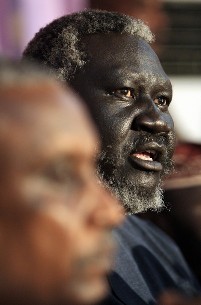US welcomes direct talks between Khartoum and SPLM-N
March 17, 2013 (KHARTOUM) – The US government has welcomed a decision by the Sudanese government to engage in AU-brokered talks with the rebel Sudan People’s Liberation Movement North (SPLM-N).

“During the interim period prior to the talks, we call on both sides to exercise maximum restraint and take no action that would worsen the conditions in Southern Kordofan and Blue Nile or impede progress toward talks”, the statement continued.
It is still not clear if and when the talks will go ahead, however, a well-placed source in the National Congress Party (NCP) on Thursday told Sudan Tribune there had been consultations between a leading member of the ruling party, the head of the African Union (AU) mediation team, Thabo Mbeki and SPLM-N leader Malik Agar.
However, the Sudanese government has reportedly demanded a further delay while it appoints a new chief negotiator to replace Kamal Obeid, who chaired its negotiating team during last year’s indirect talks.
The Sudanese government and the SPLM-N held last a number of indirect talks last year in Addis Ababa but the parties failed to hold direct discussions on the agendas proposed by the mediation.
Last week, the SPLM-N accused the Sudanese government of refusing to take part in scheduled talks, saying the mediation team had already cancelled two dates this month which had been set down for the start of negotiations aimed at resolving the conflict.
News of direct political talks between the two warring parties comes as the Sudanese government and the South Sudanese government signed an agreement last week to implement the buffer zone and to resume the exportation of South Sudanese oil through Sudanese pipelines after it was shut down over a row over transit payments.
Both Sudans signed a deal last September aimed at addressing a number of outstanding issues, as well as border conflicts, but the agreement had not been implemented due to ongoing disagreements over territory and security issues, most notably South Sudan’s alleged backing of SPLM-N rebels in South Kordofan and Blue Nile states.
The SPLM-N fought alongside the South during its protracted civil war with the north, with conflict flaring in 2011 between Khartoum and rebels fighting for the removal of the Arab-dominated regime.
South Sudan armed and trained SPLM-N when it was part of the South’s rebel force but maintains it cut all military ties before South Sudan’s independence in July 2011.
Both the SPLM-N and Khartoum have come under increasing pressure from the United Nations and AU to reach a negotiated settlement to the conflict in the Sudanese border states.
The violence has displaced more than 200,000 people in the region, who have been forced to flee to South Sudan and Ethiopia, sparking a worsening humanitarian situation.
An estimated one million more have been affected inside Blue Nile and South Kordofan.
(ST)
